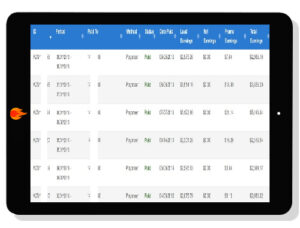Naz Capital – Blockchain and Digital Currencies
The Complete Cryptocurrency Trading Course is designed to turn you into a profitable crypto trading in a short period of time and provide you with all the proven strategies and secret tactics to earn you daily $25 – $200 profit.
What You’ll Learn In Blockchain and Digital Currencies
BLOCKCHAIN & CRYPTO CURRENCIES
Lesson 1: Evolution of currency
Lesson 2: Meet bitcoin
Lesson 2.1: Bitcoin blockchain
Lesson 2.2: What is blockchain
Lesson 2.3: Blockchain security
Lesson 2.4: Blocks verifications, hash function and proof of work
Lesson 3: What is Ethereum and how is it different from Bitcoin Blockchain
Lesson 3.1: What’s the difference between Ethereum and ether (ETH)?
Lesson 3.2: What makes Ethereum valuable?
Lesson 3.3: Ethereum vs. Bitcoin – what’s the difference?
Lesson 3.4: How does Ethereum work?
Lesson 4: Bitcoin dominance
Lesson 5: What is DXY or USD INDEX?
Lesson 5.1: What does the US Dollar index consist of?
Lesson 5.2: DXY and BTC correlation
Lesson 6: Financial market and trading instruments
Lesson 6.1: What are forward and futures contracts?
Lesson 6.2: What are perpetual futures contracts?
Lesson 6.3: What are options contracts?
Lesson 7: Trading and trading analysis
Lesson 7.1: Fundamental Analysis
Lesson 7.2: Technical Analysis
Lesson 8: What is portfolio management?
Lesson 9: What is risk management?
Lesson 10: What is a trading strategy?
Lesson 10.1: What is day trading?
Lesson 10.2: What is swing trading?
Lesson 10.3: What is position trading?
Lesson 10.4: What is scalping?
Lesson 11: Technical analysis basics
Lesson 11.1: What is shorting?
Lesson 11.2: What is the order book?
Lesson 11.3: What is a market order?
Lesson 11.4: What is slippage in trading?
Lesson: 11.5: What is a limit order?
Lesson 11.6: What is a stop-loss order?
Lesson 11.7: What are makers and takers?
Lesson 11.8: What is the bid-ask spread?
Lesson 12: What is a candlestick chart?
Lesson 12.1 How to Read Candlestick charts?
Lesson 12.2: 30 Types of Candlestick Patterns:
Lesson 13: Bullish Reversal Candlestick Patterns
Lesson 13.1: Hammer
Lesson 13.2: Piercing Pattern
Lesson 13.3: Bullish Engulfing
Lesson 13.4: The Morning Star
Lesson 13.5: Three White Soldiers
Lesson: 13.6: White Marubozu
Lesson 13.7: Three Inside Up
Lesson 13.7: Bullish Harami
Lesson 13.8: Tweezer Bottom:
Lesson 13.9: Inverted Hammer
Lesson 13.10: Three Outside Up:
Lesson 13.11: On-Neck Pattern
Lesson 14: Bearish Candlestick Pattern
Lesson 14.1: Hanging man
Lesson 14.2: Dark cloud cover
Lesson 14.3: Bearish Engulfing
Lesson 14.4: The Evening Star
Lesson 14.5: Three Black Crows:
Lesson 14.6: Black Marubozu
Lesson 14.7: Three Inside Down
Lesson 14.7: Bearish Harami
Lesson 14.8: Shooting Star
Lesson 14.9: Tweezer Top
Lesson 14.10: Three Outside Down
Lesson 15: Continuation Candlestick Patterns
Lesson 15.1: Spinning Top
Lesson 15.2: Falling Three Methods
Lesson 15.3: Rising Three Methods
Lesson 15.4: Upside Tasuki Gap
Lesson 15.5: Downside Tasuki Gap
Lesson 15.6: Mat-Hold
Lesson 16: What are trend lines?
Lesson 16: What are support and resistance?
Lesson 17: TOP 4 support and resistance strategies
Lesson 17.1: Breakout strategy (pullback)
Lesson 17.2: Trendline strategy
Lesson 17.2.1: What is Trendline Strategy and how it works Video
Lesson 17.3: Using Moving averages as support and resistance
Lesson 18: Technical indicators in general
Lesson 18.1: Leading vs. lagging indicators
Lesson 18.2: What is a momentum indicator?
Lesson 18.3: What is the trading volume?
Lesson 19: Technical Indicators
Lesson 19.1: WHAT IS A MOVING AVERAGE?
Lesson 19.2: WHAT IS THE PURPOSE OF MOVING AVERAGES?
Lesson 19.3: HOW DO YOU INTERPRET MOVING AVERAGES?
Lesson 19.3.1: To determine the direction of the trend
Lesson 19.3.2: The moving average for support and resistance levels
Lesson 19.3.3: Making use of multiple moving averages
Lesson 19.3.3: Golden cross and Death cross indicator (EMA’s)
Lesson 19.4: What is MACD?
Lesson 19.4.1: WHAT DOES MACD MEASURE?
Lesson 19.4.2: HOW IS MACD CALCULATED?
Lesson 19.4.2: MACD Indicator – How to read a chart video
Lesson 19.5: Relative strength index (RSI)
Lesson 19.5.1: How to Trade Using RSI (INDICATOR)
Lesson 19.5.2: Determining the Trend using RSI (INDICATOR)
Lesson 19.5.2: RSI INDICATOR HOW IT WORKS
Lesson 19.6: Fibonacci retracement
Lesson 19.6.1: What are the Fibonacci numbers?
Lesson 19.6.2: What are Fibonacci retracement levels?
Lesson 19.6.3: How can I use Fibonacci retracement levels?
Lesson 19.6.4: Using Fibonacci retracement during an uptrend
Lesson 19.6.5: Using Fibonacci retracement during a down trend
Lesson 19.6.6: Where can Fibonacci Retracements go wrong?
Lesson 19.6.7: How Fibonacci Indicator works VIDEO
Lesson 19.7: What BOLLINGER BANDS® and how do they work?
Lesson 19.7.1: HOW TO TRADE WITH BOLLINGER BANDS
Lesson 19.8: What is the Ichimoku Cloud?
Star Indicator: EMA Ribbon (Video)
Lesson 20: The Wallets and The Exchanges
Lesson 20.1: Cryptocurrency wallets use and security
Lesson 20.1.1: Online exchanges
Lesson 20.1.2: Software wallets/apps
Lesson 20.1.3: Cold/hardware wallets
Lesson 21: How to Use Binance Exchange: Complete Step by Step Guide
Lesson 21.1: Your Binance Wallet
Lesson 21.2: Depositing Funds
Lesson 21.3: Withdrawing Funds
Lesson 21.4: Coin info
Lesson 22: The Exchanges: Basic and Advanced
Lesson 22.1: Controls
Lesson 22.2: Trading
Lesson 22.3: Market Orders
Lesson 22.4: Limit Orders
Lesson 22.5: Order Management
Lesson 22.6: Supported Currencies
Lesson 22.8: What is BNB Coin?
Lesson 22.7: Fees and Limits
Lesson 22.9: Security
Lesson 22.10: Customer Support
Lesson 23: A beginners guide to metamask
Lesson 23.1: What Can You Do With Metamask?
Star Indicator: Golden and Death cross (KENCHI) (Video)
Scalp Indicator: SSL Hybrid
Star Indicator: RSI (Relative Strength Index)
Video Based training session 1
Video Based training session 2
Video Based training session 3
Video Based training session 4
Video Based training session 5
Video Based training session 6
Video Based training session 7
How to use Fibonacci Retracement and Bollinger Bands on Low time frame (Scalping)







